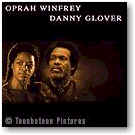Beloved
Film Reviewed by Michael Dequina
 BELOVED (1998)
BELOVED (1998)
Based on Toni Morrison’s Pulitzer Prize-winning novel
| MPAA: Rated R for violent images, sexuality and nudity. |
| Runtime: USA 172 |
Staring
| Oprah Winfrey | …. | Sethe |
| Danny Glover | …. | Paul D |
| Thandie Newton | …. | Beloved |
| Kimberly Elise | …. | Denver |
| Beah Richards | …. | Baby Suggs |
Review by Michael Dequina
Jonathan Demme’s BELOVED, based on Toni Morrison’s Pulitzer Prize-winning novel of the same name, is a movie of moments—moments of raw, lyrical emotional power scattered over a nearly three-hour time expanse. While the extended running time does little to dilute the potency of these isolated moments, it does, however, blunt the dramatic urgency of the assembled story. Instead of cutting deep into the heart, BELOVED pierces the heart; the film is indeed moving, but lacking the momentum to make a sweeping emotional impact.
BELOVED is named after a character in the story, a mysterious young woman (Thandie Newton) who shows up in the yard of Sethe (Oprah Winfrey) one morning in 1873. Sethe is a runaway slave trying to provide a decent living for herself and her daughter Denver (Kimberly Elise) on the outskirts of Cleveland, Ohio. With the arrival of old friend Paul D (Danny Glover) and, later, the childlike Beloved (whom she takes in), Sethe’s life appears to be taking a turn for the better, but the secrets of her tortured past refuse to rest in peace.
It is my understanding that the screenplay, credited to Akosua Busia, Richard LaGravenese, and Adam Brooks, is remarkably faithful to Morrison’s narrative structure. In theory, fidelity to source material is a good thing, but it does not completely work here. Often, watching BELOVED feels like reading a book—a good thing if one is indeed reading, but not necessarily what one is looking for when watching a film. Although the basics of Morrison’s story and her characters are compelling, not much really _happens_—at least not enough to sustain the 172-minute running time. As such, the memorable moments—and there are quite a number of powerful ones, particularly some harrowing, hard-to-watch flashbacks of the young Sethe’s (Lisa Gay Hamilton) horrific past—are a bit too widespread to make an assembled effect. Any emotional response to any given moment exists independently of any other.
Still, I must give Demme and the writers credit for the risks they take. In duplicating Morrison’s timeline-jumping structure, they demand an inordinant amount of concentration from the viewer, and very few films present such a fascinating challenge. And while the structure and stately pace work against the building of narrative momentum, they create a haunting—or, rather, _haunted_—atmosphere. Most of the key action in BELOVED takes place in the past, and the film makes an uncanny duplication of the seemingly cyclical nature of memories in one’s mind, revealing its secrets little by little, fragment by fragment, leaving certain events only to retrace and expand on them later. Granted, this technique makes a lot of the action hard to follow, sometimes frustratingly so, but it creates a feeling that is rich and unique. Also unique is how Demme isn’t afraid to show the grimy nature of life in the time period; instead of giving everything a shiny Hollywood sheen, the dirt and grit is always there, on the sets and even the actors.
Also extending to the cast is this element of risk. Taking the most chances is Newton, who delivers a raw, unpredictable performance. Called upon to bare body and soul, adopt maladroit body movements and slurred speech rhythms, she could have easily come off as ridiculously overwrought and alien, but her soulful eyes consistently project a tempering humanity. Not to be outdone, of course, is Winfrey. People forget that before she became a daytime TV phenomenon, she first made a name of herself as an Oscar-nominated actress (for THE COLOR PURPLE), and her work here is restrained and, as such, the more emotionally honest; the same goes for Glover. But the standout performer is the one who will likely be the most overlooked—Elise. She doesn’t have a role as literally showy as Newton’s, nor does she have the star power of a Winfrey or Glover, but she is BELOVED’s steadying force. Denver has the most dramatic evolution out of all the characters (from shut-in to independent woman), yet remains the most stable; the key is to not play the change as if it were dramatic but natural. Elise’s performance is so natural that it is easy to forget she is an actress playing a part.
BELOVED is a wearying film, and that comment should be interpreted in all the ways it can be. On the positive side, the filmmakers so successfully create the intended air of melancholy that it is daunting. But on the negative end, one cannot help but feel exhausted, emotionally and physically, after three slow hours. Similarly, by that time the film is also exhausted. I was indeed be moved by BELOVED, but in the end, there wasn’t enough momentum left to truly sweep me away, as it should have.

Read More AALBC.com Film Reviews
